Proposed changes to league tables will make “little difference” to the progress 8 and attainment 8 scores of most schools, but will likely affect GCSE entries, with just 65 per cent of current students filling all slots on the reformed measures, analysis suggests.
FFT Education Datalab has analysed the impact proposed changes to league tables will have, based on entries and outcomes for pupils who say their GCSEs last year.
At present, schools are given a progress score based on pupils’ improvement since primary school in eight subject “buckets”.
The first two are English and maths, and three more have to be EBacc subjects – including sciences, languages or humanities. The remaining three are “open” buckets for any other qualifications.
Under the government’s proposal, English and maths will remain the first two buckets, but two buckets will be created specifically for science qualifications, including double science, the separate sciences and computing.
The remaining four would be new “breadth” buckets, and these would have to include a subject from two of the three categories of humanities, creative subjects and language.
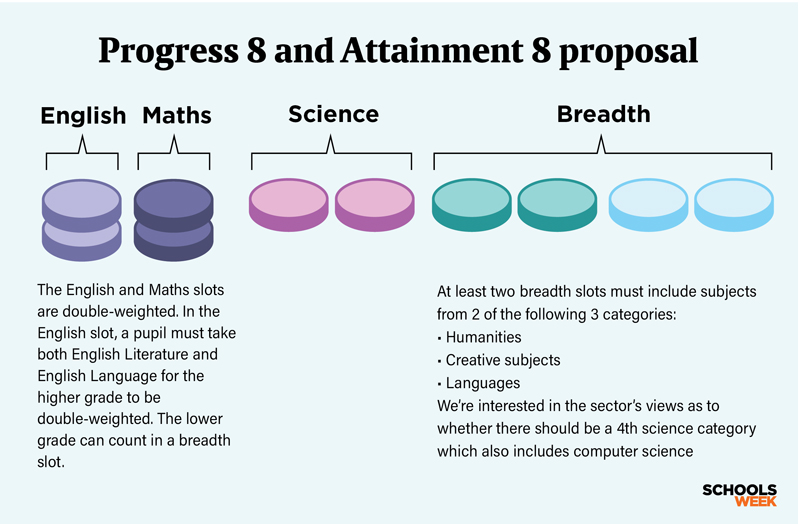
‘Little difference’ to scores
Datalab’s analysis found that if applying the new rules to last year’s results, 92 per cent of schools “ended up with a revised score within 0.1 points of their existing score”.
Six per cent of schools would have a progress 8 score between 0.1 and 0.2 points below their previous score, and just 1 per cent would have a score over 0.2 points lower.
The effect on attainment 8 scores was also minimal, the analysis found.
The national average score for state-funded mainstream schools “would have fallen by 1 point from 46.9 to 45.9 had the new method been used in 2024”.
Thirty-six per cent of pupils would have had a lower attainment 8 score if the new methodology had been used last year.
For 7 per cent, the difference would have been 5 or more points lower. Around 2 per cent would have achieved a higher score.
1 in 3 pupils’ entries not compliant
However, the changes are “likely to have more of an impact on the qualifications for which pupils are entered”.
Datalab found that just 65 per cent of pupils in 2024 entered qualifications that would have filled all 10 slots of the new league tables measures (English and maths are double-weighted).
This was “largely due to having insufficient entries to fill group 4, the slots reserved for 2 subjects from humanities, creative subjects and languages”.
This was “particularly the case for disadvantaged pupils. Fifty-four per cent filled all 10 slots.”
Overall, 33 per cent of pupils do not fill their group 4 slots.
Six per cent of pupils had no entries in any of the three categories of subject. Twenty-three per cent were only entered for a humanities subject, 3 per cent only for a creative subject and 1 per cent just for a language.
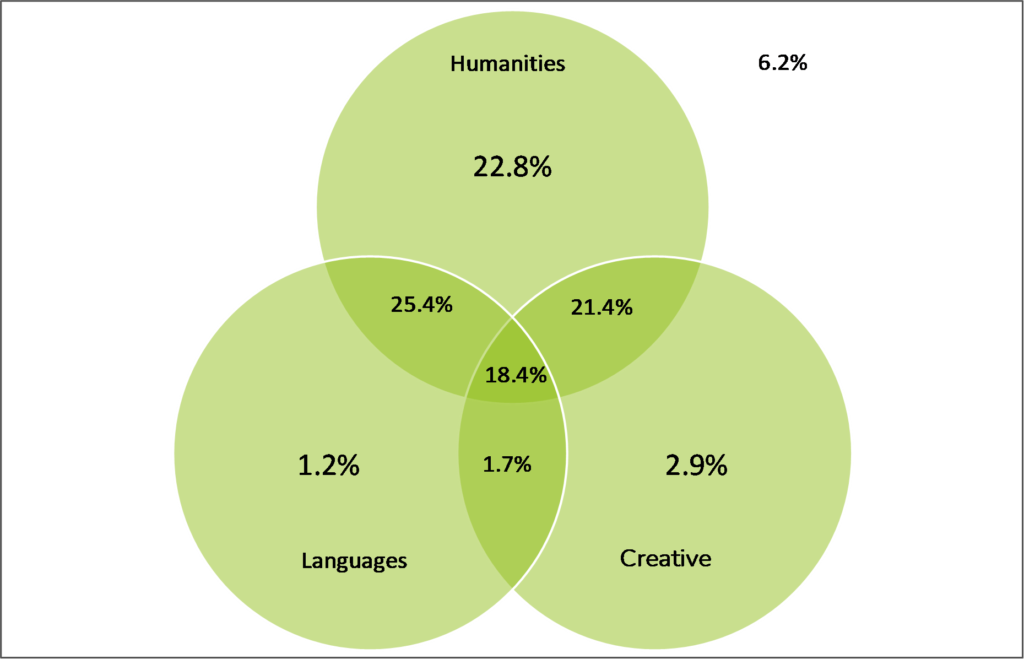
The new measures will class religious studies as a humanities subject for the first time. Datalab said 88 per cent of pupils entered at least one humanities subject based on the new definition in 2024.
Overall, 35 per cent of pupils currently enter two or more humanities subjects. This is because “many students currently take geography or history to count alongside double science in order to fill the EBacc slots.
“There is a risk that entries will fall as a result of the less restrictive new methodology.”
‘A shift back to GCSE’
The government has also said that vocational and technical qualifications won’t count in group 4 under the new measures. For example, a technical award in performing arts won’t count as a pupil’s creative subject.
Dave Thomson, who ran the analysis for Datalab, said this was “likely to result in a shift back to GCSE.
“Secondly, the incentives to enter pupils for geography or history have been reduced.
“What we will see is an increase in the percentage of pupils filling their ‘group 4’ slots. This will mean taking either a creative subject or a language.
“Given the harsher grading of languages, I suspect that we will see more of an increase in entries in the creative subjects.”
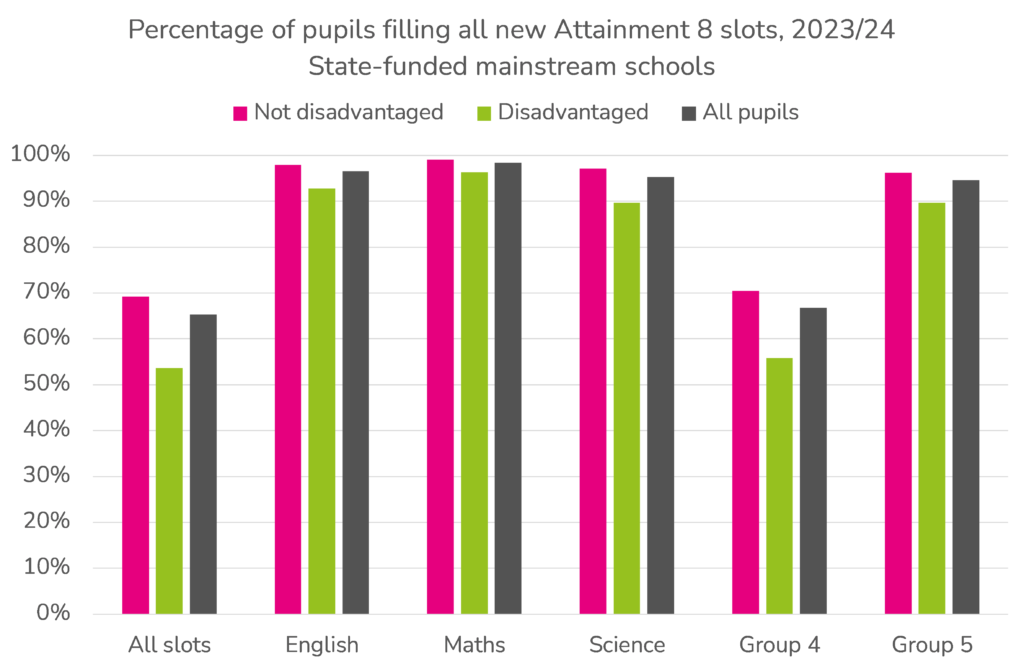
Leaders say they won’t change tack
Leaders of schools with some of the highest progress 8 scores in the country have said they won’t change their approach when the league table measure is reformed.
But some heads have expressed fears other settings may feel pressure to amend GCSE entry patterns to fit with the new regime, with language uptake at risk.
The government has not confirmed its final approach, and may change tack to also allow science subjects in the fifth and sixth buckets. It means schools won’t know yet whether their current entries will be compliant with the reformed measure.
But leaders of high-performing schools approached by Schools Week said they had no plans to change their approach.
The St Thomas the Apostle College in Peckham, south London, had a progress 8 score of 1.45 in 2024, the tenth highest in the country. It entered pupils to 23 different GCSE and four technical award qualifications this year.
Executive headteacher Serge Cefai said progress scores were the “most accurate measure we have of assessing how well a school is doing”, but that seeking a high score did not trump what’s best for pupils.
“Kids don’t leave with a progress 8 score. They do need the attainment. So we always get driven by what the kids need and if they don’t fit the baskets properly, quite frankly, so what?
“What we have found is by doing the very best for the kids, by getting that broad and balanced curriculum that they need…the progress 8 looks after itself.”
Cefai added he had “stopped a while ago insisting that the children took history and geography when they were really wanting to do art or music”.
‘We don’t want to restrict the curriculum’
Bournemouth School, a grammar which has a “well above average” progress 8 score of 0.71, enters all or most pupils for English, maths, physics, biology, chemistry, a language and a humanities subject.
Headteacher Dr Dorian Lewis told Schools Week that at a recent meeting of selective school heads “the consensus around the table was that we felt that we wouldn’t be changing what we’d be offering to manipulate the new progress 8 figure, because actually we would be okay without doing that”.
However, he feared some schools would consider moving away from making languages compulsory following the scrapping of the EBacc.
“I think a school like ours was quite comfortable being within the EBacc, and we’re going to continue the same criteria that we’ve always done, which does match the EBacc.
“We think it’s a broad and balanced curriculum and we don’t want to restrict the curriculum in any artificial way to meet the needs of these new progress measures.”
‘No-one’s going to force me to do anything’
King’s Leadership Academy Warrington, which has a well above average progress 8 score of 0.5, entered pupils for 13 different GCSEs and five technical awards this year.
Principal Umar Hussain said the school would continue to maintain its model of a “strong academic curriculum complemented by arts”.
He warned the new progress 8 proposal had become “very, very specific what can be included in the different elements, the different measures.
“Now, with it being so specific, what many schools will do, they will end up going down, changing their curriculum offers specifically to what is going to be measured.”
Schools may fear that not changing their subject entries will trigger Ofsted inspections, he said.
But “no-one’s going to force me to do anything. I’m going to do what’s right by my school, my kids, my staff, and what’s going to get them success for the future. But I’m not the only school.”
Bedford Free School’s progress score is “well above average” at 1.11.
Stuart Lock, CEO of its sponsor Advantage Schools, said he could only speculate as final plans are not confirmed, but “we won’t change tack in that broadly what we’ve done will fit the buckets as they’ve planned.
“I think short term, there will be almost no difference. I think long term, it may become commonplace to have pupils choose between a language and an art.
“And I think that that might have an unintended negative effect on languages. But I can’t be sure about that, because I can’t play it out.”


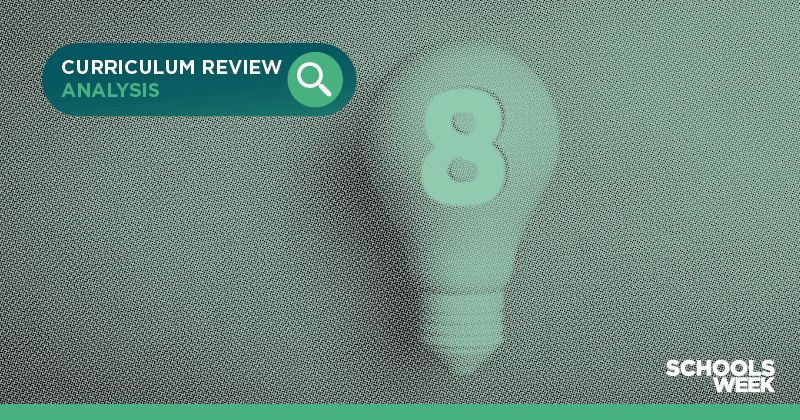








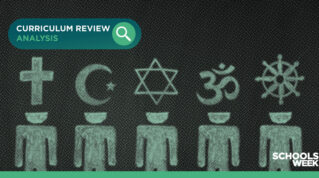
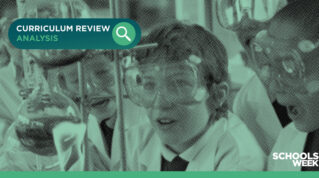
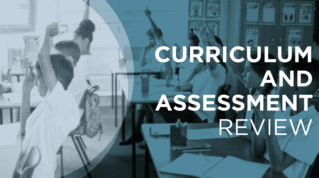
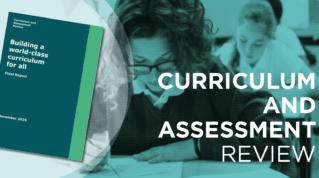

Your thoughts